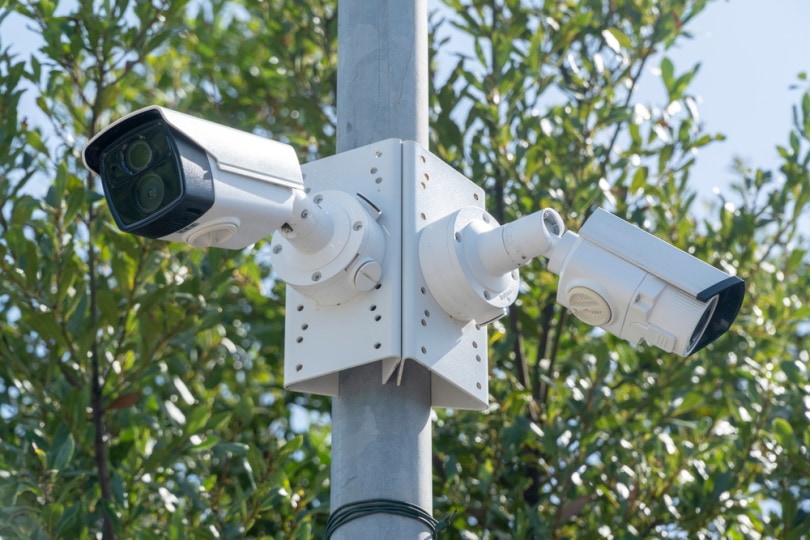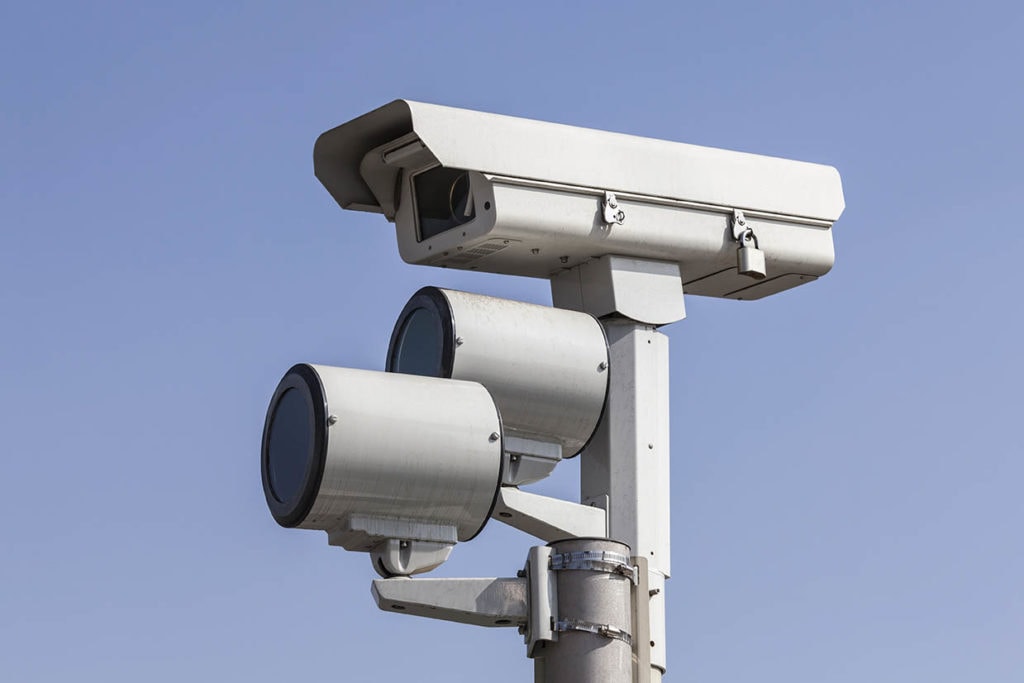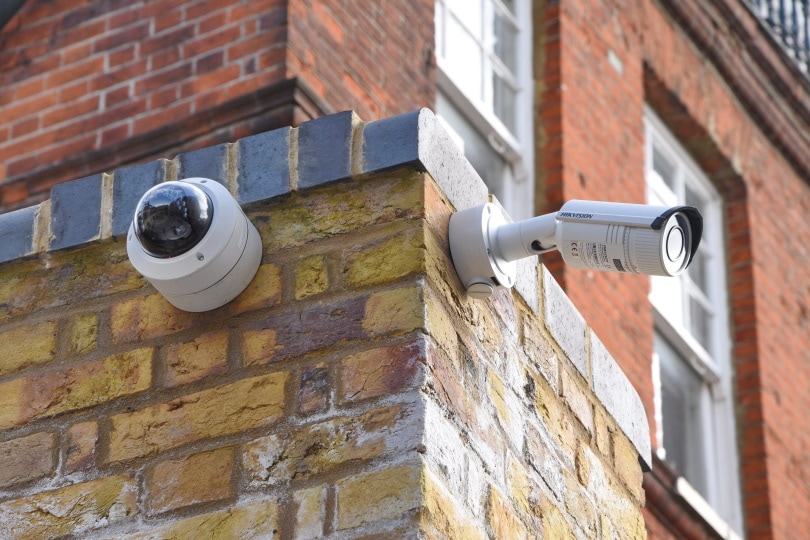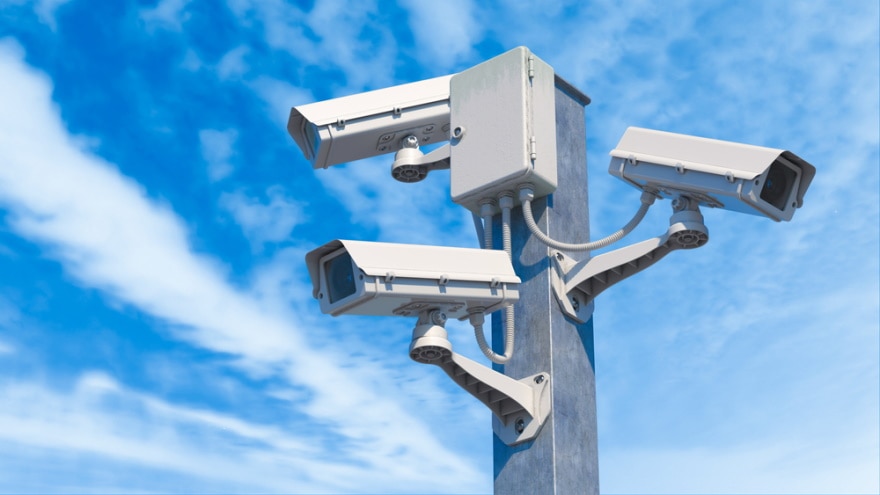11 Security Camera Statistics & Data – 2024 Update
Last Updated on

Note: This article’s statistics come from third-party sources and do not represent the opinions of this website.
Across the world, video surveillance has become a popular way to monitor traffic stops, prevent and solve a crime, and keep our homes safe. Some of us are concerned about what it could mean for our privacy rights, as well as what it can do to benefit everyday life. In this article, we’ll go over a list of data-driven statements from reputable sources that will inform you about their prevalence, usage, and more. You never know, maybe some of these will surprise you!

Top 11 Surveillance Statistics
- The US is projected to hit the $21 billion mark for security camera valuations.
- Delhi, India has over 1,800 surveillance cameras per square mile.
- China owns more than 50% of the global supply of video surveillance systems.
- Closed-circuit television (CCTV) reduces roadway crime by 24% and train station crime by 28%.
- There’s a 47% reduction in crime when security cameras are visible.
- There are over 112,000 instances where CCTV was used for investigation in Britain.
- There has been an 18% increase in crimes solved in New South Wales.
- Stores or businesses with cameras are 33% less likely to have crime at their site.
- One-third of people have a security camera to protect their homes.
- The consumer brand that buyers most trust with their money is Brinks.
- A fifth of households in the US have at least one security camera.

Security Camera Quantities and Value
1. Security Surveillance will hit the $21 billion mark for security camera valuations.
(Mordor Intelligence)
By 2026, the market analysis company Mordor Intelligence estimates that the market valuation of security cameras will have surpassed $21 billion and includes industries such as retail, hospitality, factories, and even more workplaces.

2. Delhi, India has over 1,800 surveillance cameras per square mile.
(Comparitech)
According to studies on Comparitech.com, Delhi is the city with the highest density of CCTV per square mile. This also means that for their 16.3 million residents, there are about 33 cameras for every 1,000 people.
3. China owns more than 50% of the global supply of video surveillance systems.
(Comparitech)
The East Asian nation of China has rapidly grown its technology to meet the standards of modern industrialization, as well as the social infrastructure used to view the activities of every citizen. Not only does it have more than half of the current video surveillance supply of 770 million, but it also holds the majority of the biggest surveillance cities on the planet.


Crime Prevention and Solutions
4. CCTV reduces roadway crime by 24% and train station crime by 28%.
(City University of New York)
A study conducted by the City University of New York (CUNY) determined that street and subway offenses were reduced by 24% and 28% by implementing video cameras in public areas. As for parking spaces, this wasn’t the case. In a place like New York, this proves well due to its high population and crime rate.
5. There is a 47% reduction in crime when security cameras are visible.
(ProLux Security)
In South Korea, an experiment was done to find out whether video surveillance made a difference in thievery and violent acts and found that it reduced these scenarios by 47%. It also lowered the public’s safety concerns in areas with CCTV.

6. There are over 112,000 instances where CCTV was used for investigation in Britain.
(European Journal on Criminal Policy and Research)
In the UK, more than 250,000 instances of crime were able to be used for investigation purposes. Of them, 45% could be used to trace perpetrators in closed-circuit television, and 29% of the cases were aided by footage captured in public spaces. On top of that, a small town in Scotland reported that their success rate in resolving active investigations grew by 8% (from 50%–58%) after applying video surveillance to their study’s location. That may seem like a fraction of importance, but it adds up over time.
7. There has been an 18% in crimes solved in New South Wales.
(Australian Institute of Criminology)
Occasions where video surveillance was not provided in criminal investigations are less likely to succeed by about 18%, based on a scientific article by Australia’s Institute of Criminology. Those instances without video evidence were only 21% likely to succeed, whereas those with it jumped to 24.8%. The outcomes were conducted for wrongdoers who committed acts such as vandalism or stealing belongings.

8. Stores or businesses with cameras are 33% less likely to have a crime at their site.
(SEi Security)
You heard it right—businesses that invest in a video surveillance system are 33% less likely to have crime on their property. That also goes for homeowners, too, according to SEI Security’s findings. This is due to what they call “situational crime prevention,” which is founded on creating a setting that discourages bad behaviors and makes perpetrators feel like they are being watched.

Home Surveillance
9. One-third of people have a security camera to protect their homes.
(SurveyMonkey)
A survey by SurveyMonkey reveals that a third of residents who participated claim to have a crime-deterrent set up in their house or apartment space. This is important because it doesn’t state specifically the use of cameras alone, which indicates that even fewer people have video systems in place. Of the people who were surveyed, 44% say they plan to upgrade their security tech within a year, and 55% say they will keep things the same. Only 1% said they would remove their setup entirely.

10. The consumer brand that buyers most trust with their money is Brinks.
(Porch.com)
After evidence was gathered from 985 survey participants, Porch.com suggests that Brinks is the company that people trust when it comes to home security spending. This winner is followed by Ring, Arlo, Vivint, and SimpliSafe. They’ve also mentioned that buyers put down $100 more dollars when getting an entire security kit rather than cameras alone.
11. A fifth of households in the US have at least one security camera.
(IPVM)
As reported in a couple of IPVM surveys, only a fifth of US households watch over their properties with video footage. There are roughly 120 million households in the US based on their data, with approximately 24 million having video surveillance. They state that an increase in security ownership is likely caused by technological advancements (camera quality/sharpness, Wi-Fi integration, etc.) and affordability.

Frequently Asked Questions About Security Camera Stats
- Do security cameras decrease crime?: Based on the statistics we gathered above, video surveillance does reduce crime, but the extremity depends on location and usage. For example, in the US, South Korea, and the UK, it decreased by at least 20%.
- What percentage of homes have security cameras?: According to SurveyMonkey, around 30% of homeowners have a security system in place, but it doesn’t account for just cameras alone.
- How many security cameras are there in total?: It’s estimated that the total number of security camera units exceeds 770 million around the globe and is expected to reach over 1 billion soon.


Conclusion
Video surveillance is moving quickly with the rise of facial recognition technology, and every major country seems to be competing for the top spot in crime prevention. It isn’t only nations themselves, but individual households are growing their usage of CCTV to deter unwanted activities as well, and it has become easier and more affordable to purchase these tools. In this article, our statistics were curated for many different areas of usage, and we hoped you learned some interesting data that you can harness to make your own opinions about the state of video surveillance.
Featured Image Credit: stockwars, Shutterstock
Table of Contents
- Top 11 Surveillance Statistics
- Security Camera Quantities and Value
- Crime Prevention and Solutions
- 4. CCTV reduces roadway crime by 24% and train station crime by 28%.
- 5. There is a 47% reduction in crime when security cameras are visible.
- 6. There are over 112,000 instances where CCTV was used for investigation in Britain.
- 7. There has been an 18% in crimes solved in New South Wales.
- 8. Stores or businesses with cameras are 33% less likely to have a crime at their site.
- Home Surveillance
- Frequently Asked Questions About Security Camera Stats
- Conclusion
About the Author Robert Sparks
Robert’s obsession with all things optical started early in life, when his optician father would bring home prototypes for Robert to play with. Nowadays, Robert is dedicated to helping others find the right optics for their needs. His hobbies include astronomy, astrophysics, and model building. Originally from Newark, NJ, he resides in Santa Fe, New Mexico, where the nighttime skies are filled with glittering stars.
Related Articles:
15 Photography Industry Statistics, Trends, & Data (2024 Update)
18 Virtual Reality Statistics and Data – Updated in 2024
12 Glasses Industry Statistics & Data – Updated in 2024
15 Drone Statistics & Data – Updated in 2024
17 Red Light Camera Statistics & Data – Updated In 2024
13 Digital Camera Sales and Statistics – Updated In 2024
13 Police Body Camera Statistics and Data – Updated in 2024
